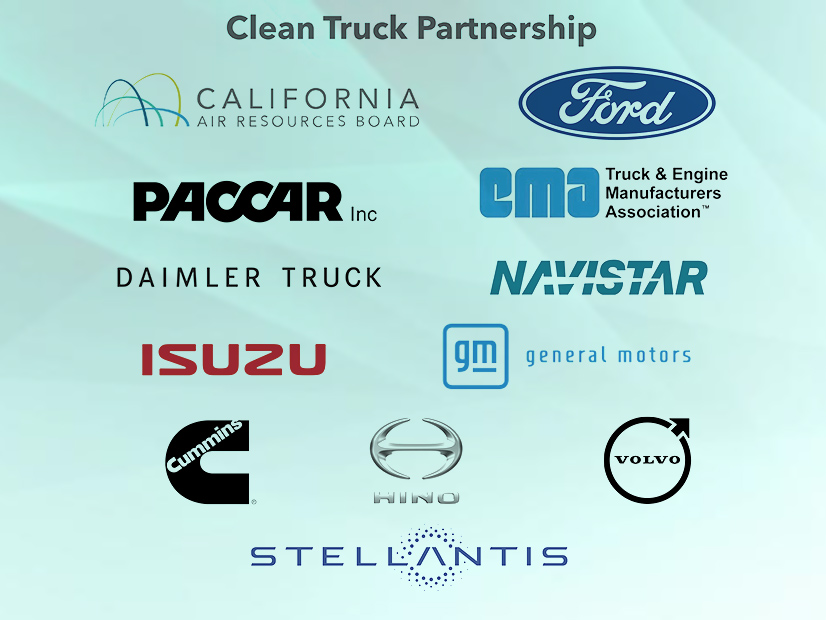
California regulators have approved changes to a zero-emission truck regulation to make compliance easier, keeping their end of a deal with truck manufacturers over the transition to ZEVs.
The California Air Resources Board (CARB) voted Oct. 24 to adopt amendments to the Advanced Clean Trucks (ACT) regulation. ACT requires medium- and heavy-duty truck manufacturers to provide zero-emission vehicles as an increasing percentage of their annual sales in the state. The regulation takes effect with model year 2024, but manufacturers have been able to earn early credits since model year 2021 with options to bank and trade credits.
If truck makers don’t meet their quota in a particular year, they’ll now have three years to make up the deficit, rather than the one year allowed before the amendment. Providing even more flexibility, credits from near-zero-emission trucks may now be used to meet up to half of the carried-over deficit. NZEVs, which include plug-in and wireless-charging hybrids, generate partial credits based on their all-electric range.
Another change to the ACT regulation is the manner in which ZEV credits are earned. Under the approved amendments, a manufacturer earns ZEV credits by producing and delivering a zero-emission truck for sale in California. Previously, the ZEV had to be sold to “the ultimate purchaser in California” in order to generate a credit.
“[Manufacturers] will no longer have to follow and document a vehicle’s entire pathway through upfitters and dealerships to its actual owner-operator,” Kat Talamantez of CARB’s mobile source control division said during the hearing.
Instead, manufacturers will receive credits when a ZEV is delivered to the initial entity, such as a dealer.
Clean Truck Partnership
CARB agreed to pursue changes to ACT as part of a deal it made with truck manufacturers in July 2023 called the Clean Truck Partnership. In exchange for CARB giving manufacturers more flexibility to comply with its regulations, the truck makers pledged to meet California’s vehicle standards, including a requirement to produce and sell only ZEVs starting with model year 2036. (See CARB, Manufacturers Partner to Support Clean Truck Rules.)
And under the agreement, the manufacturers’ commitment will continue even if the regulations face legal challenges. The partnership includes CARB, the Truck and Engine Manufacturers Association, and 10 truck manufacturers.
In addition to ACT, the agreement addresses CARB’s heavy-duty engine and vehicle omnibus rule, a 2021 regulation that increased the stringency of tailpipe emission standards for trucks with internal combustion engines. The regulation allows the sale of a certain number of “legacy” engines that meet 2010 standards; in 2023, CARB raised the cap on legacy engine sales to help prevent a shortfall during a 2024-2026 transition period.
Diesel Engine Shortages
The proposed amendments to ACT were presented to the CARB board in May, but a vote was postponed after several dealers said they were having problems getting diesel trucks from California manufacturers. Some said the ACT regulation was to blame. The speculation is that manufacturers are withholding internal combustion trucks to reduce the number of ZEVs they’re required to provide.
CARB staff researched the issue, meeting with more than 40 dealers, fleet owners and manufacturer representatives.
The issue turned out to be “complicated with several contributing factors,” Talamantez told the board.
“However, all manufacturers have explicitly indicated that the product availability issues for the 2024 model year are not caused by the ACT regulation,” she said.
Further evidence that ACT is not causing diesel truck shortages is the ample supply of ZEV credits, CARB Executive Officer Steven Cliff said in a memo to the board.
CARB has noted that the number of ACT credits from model years 2021 and 2022 were about 60% more than the amount needed to meet requirements expected for model year 2024, and even more credits were racked up in model year 2023. (See California Far Outpacing Clean Truck Targets.)
Many truck manufacturers have accumulated their own ACT credits, and most are open to buying credits “if the economics make sense,” the memo said.
Instead, the diesel truck shortage may be related in part to the heavy-duty omnibus regulation and manufacturers’ “intentional business decision” to produce the limited number of engines that are not compliant with the regulation, as allowed by its legacy provisions, Talamantez said during the meeting.
Other factors contributing to the diesel truck shortage include a nationwide downturn in the market, lingering supply chain issues and manufacturers not yet being ready to comply with the omnibus regulation.
Cliff noted in his memo an apparent “discrepancy” between what manufacturers are telling their customers about the diesel truck shortage versus what they’re saying to CARB.
Cliff said truck makers might be telling customers the shortage is due to ACT as “a sales strategy to continue ramping up ZEV sales and towards building a credit bank for the ACT requirements in the 2025 and 2026 MYs despite the current surplus of ACT credits.”



